Dash Kappei or Gigi La Trottola? - A Postcard from the Past or a Misplaced Love Letter?
 Dash Kappei, the Old Faithful Gigi
Dash Kappei, the Old Faithful Gigi
Dash Kappei. Or actually, as we all remember it, Gigi La Trottola. This name, for many of us, sounds like a dusty VHS tape found at the bottom of a closet, full of childhood memories and carefree afternoons in front of the TV. The series, which arrived on the screens of Polonia 1 in the 1990s, has etched itself in the memory of an entire generation as one of the first anime series that dared to cross the borders into Poland. "Dash Kappei", known in Poland under the Italian title "Gigi La Trottola", is a Japanese anime series that tells the story of an incredibly energetic and imaginative high school student, Kappei (in the Italian translation and on Polonia 1 - Gigi). The series, an adaptation of a manga by Noboru Rokuda, quickly gained popularity in Japan (in 1981), then worldwide (in 1982), and finally, albeit a bit belatedly, in Poland (in 1994) thanks to its humor and somewhat absurd, yet charmingly memorable characters.
Polonia 1, a television station known for introducing novelties to the Polish TV market (novelties like Yattaman from 1976, Daimos from 1978, or the brand new “The Fantastic World of Paul” from 1982), attracted crowds of young viewers. It's worth remembering that these were times when television channels had a much greater influence on shaping the tastes and interests of the younger generation than today. "Dash Kappei" was certainly not a masterpiece of cinematography, but it had something that attracted and remained in memory - perhaps it was the sincere, slightly infantile fun in storytelling intertwined with dense humor, or maybe we were just less demanding. Either way, the effect is such that this anime has remained in the memory of many of us for the rest of our lives (this time without Polonia 1).
The Creation of Dash Kappei
 The Idea of Noboru Rokuda
The Idea of Noboru Rokuda
Noboru Rokuda, a manga-ka (manga creator) known for his distinctive style and love of humor, began working on "Dash Kappei" in the late 1970s. The manga debuted in 1980 in the "Weekly Shōnen Sunday" magazine, published by Shogakukan, one of Japan's leading comic book publishers. Rokuda's inspiration was the combination of Japanese school humor with sports elements, which was a fresh approach in the world of manga at the time.
The central character of the manga is Kappei Sakamoto, a young and extraordinarily agile high school student with unusual sporting skills, and also an incorrigible joker. Crucially, in the plot of this series, he is incredibly short, the shortest in his class. The story focuses on his adventures in the school basketball club, although Kappei tends to get involved in various sports disciplines. The series clearly shows the influence of Japanese school culture and the sports that are popular there.
 Adapting the Manga into Anime
Adapting the Manga into Anime
The quick popularity of the "Dash Kappei" manga prompted Studio Pierrot, one of Japan's leading animation studios, to decide to adapt the series into an anime format. The studio, now known for producing hits like "Yu Yu Hakusho" and "Naruto", took on this task, seeing potential in Rokuda's humorous and dynamic style.
Work on the adaptation began in 1981. One of the challenges was to transform the manga's humor, which was specific and based on visual gags, into something that would resonate well with anime viewers. Some elements of the story and characters were changed to better suit the TV format and a wide audience.
Anime Premiere and Reception
The anime "Dash Kappei" premiered in Japan on October 4, 1981, broadcasted by Fuji TV. The series quickly gained popularity thanks to its unique combination of humor, action, and sports. Characteristic of the series were fast cuts, exaggerated expressions of the characters, and unexpected plot twists, which appealed to the Japanese audience.

Linguistic Nuances of the Title
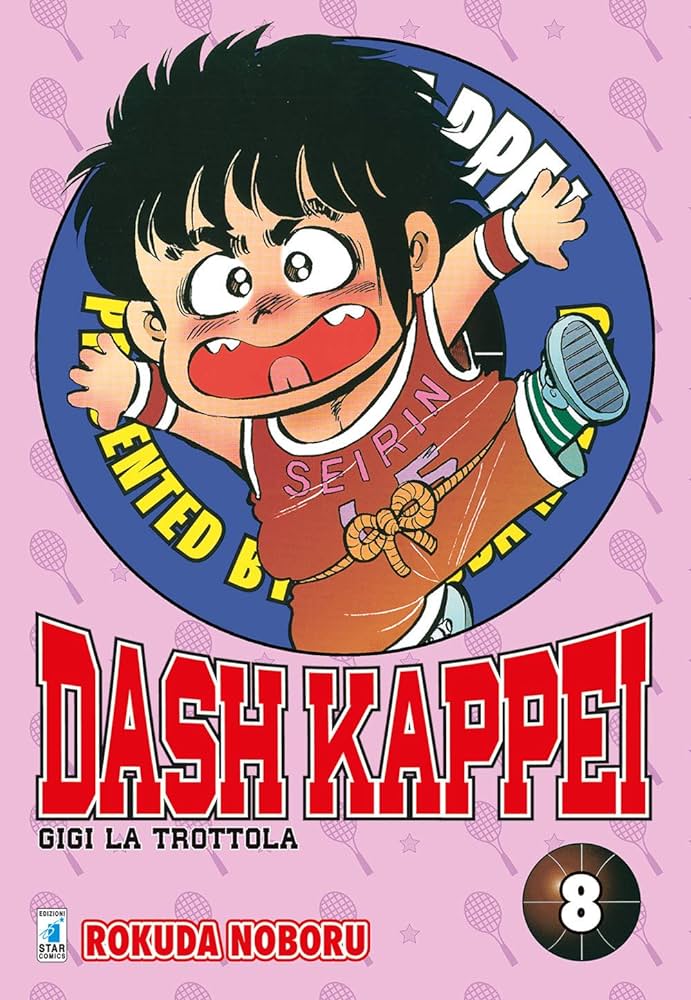
In the Italian version, the title was transformed into "Gigi La Trottola", which literally means "Gigi the Top". Though this name might seem surprising at first glance, it effectively captures the main character's continuous activity, agility, and ability to plunge into whirls of crazy adventures. Gigi, being the Italian equivalent of the Japanese Kappei, takes on his own European identity, while still maintaining the essence of the original character.
The titles, both in the Japanese and Italian versions, significantly influence the perception of the series. In Japan, "ダッシュ勝平" directly indicated the sporty and energetic character of the series, whereas "Gigi La Trottola" for Italian viewers might have emphasized the more humorous and light aspect of Gigi's adventures.
Dash Kappei: Plot and Characters
Main Plot: Kappei's Sports Antics
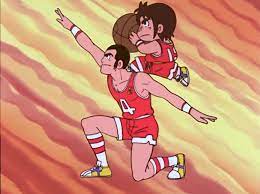
 Kappei: A Blend of Agility and Humor
Kappei: A Blend of Agility and Humor
Kappei, as the main character, is a mix of athletic talent and incorrigible joker. His approach to life and sports is full of humor and light chaos, often leading to funny situations. His distinctive appearance - small stature combined with athletic agility - makes him not only a unique athlete but also a source of comedic gags.
 Other Characters: A Colorful Team
Other Characters: A Colorful Team
Alongside Kappei, the series offers a gallery of colorful characters, including Akane (Anna for those who discovered this anime through Polonia 1), the object of Kappei's affection, and Chompa and Seiichi, his schoolmates and friends. Each of these characters brings their unique traits and sense of humor to the story. They are part of many humorous and often absurd situations that enrich the narrative and highlight its light tone.
 Absurdity in Sports Plots
Absurdity in Sports Plots
The sports challenges in which Kappei participates often balance on the edge of absurdity (or don't balance at all but are far on the side of nonsense). From basketball, through baseball and ping pong, to skiing - every sport becomes a pretext to introduce new, often exaggerated gags and situations that would be impossible in the normal world of sports. It is these overdrawn scenes that make "Dash Kappei" exceptionally funny and unforgettable.
 Romantic Threads and Their Comical Aspects
Romantic Threads and Their Comical Aspects
In addition to the sports feats, "Dash Kappei" also explores romantic threads, mainly through the relationship between Kappei and Akane (Anna). This part of the plot, though it has its sweet moments, is equally saturated with humor and misunderstandings. Kappei's romantic adventures add an extra dimension to the series, though they are often as absurd as the rest of his adventures. To add even more comical absurdity, Anna's dog, who is jealously hostile towards Kappei, himself envisions a future as Anna's husband.
 Kappei's Rivals: Competition on and off the Field
Kappei's Rivals: Competition on and off the Field
In the world of "Dash Kappei," there is no shortage of rivals who pose a challenge to Kappei's athletic abilities. One of the most memorable is Yoshirin, Kappei's classmate, who often becomes his rival in various sports disciplines. Yoshirin, characterized by both athletic talent and a certain degree of envy towards Kappei, adds an element of competition to the storyline. Their duels are often full of humor and unexpected twists, further enriching the narrative.
 Akane or Anna: Sense, Beauty, Object of Sighs
Akane or Anna: Sense, Beauty, Object of Sighs
Akane Aki, though often portrayed as Kappei's romantic interest, also has her own distinct character traits. She is intelligent, resourceful, and often proves to be more sensible than Kappei in her decisions. Her relationship with Kappei is full of humorous misunderstandings and funny situations, making her an essential element of the series, introducing an additional layer of dynamics between the characters.
 Reception in Japan and Around the World
Reception in Japan and Around the World
In Japan, "Dash Kappei" quickly gained popularity after its release, mainly due to its unique combination of humor, sports, and dynamic action. Viewers appreciated both the exaggerated, comedic aspects of the series and its ability to blend these elements with exciting sports scenes. However, some aspects of the series, especially its more absurd and sometimes controversial humor, also sparked some discussions. Despite this, "Dash Kappei" maintained a steady audience and gained a group of loyal fans who valued it for its originality and fresh approach to anime themes.
Outside of Japan, "Dash Kappei" gained popularity in many countries, becoming a cult work in some of them. Italy embraced the series under the title "Gigi La Trottola", where it gained widespread popularity, becoming one of the characteristic anime of the 80s. Similarly, in Poland, where the series debuted on Polonia 1 in the 1990s, "Dash Kappei" quickly gained cult status, attracting crowds of young viewers and remaining in their memory as one of the first anime broadcast in Poland.
Adaptations of "Dash Kappei"
The most significant adaptation of "Dash Kappei" in video games was a title released for the Nintendo Famicom console (known in the West as NES), which premiered in Japan in December 1985. The game was titled "Dash Kappei: Gigi no Yabō" ("Dash Kappei: Gigi's Ambition") and was a platformer genre game. Players took on the role of Kappei (Gigi), going through various levels that reflected his sports skills and adventures known from the anime series. The game mechanics included typical platformer actions like jumping, running, and avoiding obstacles, as well as agility elements associated with various sports disciplines, faithfully reflecting the spirit of the original series.
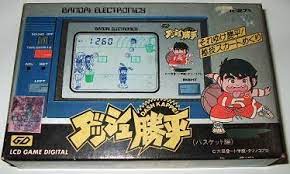
Gigi from Polonia 1
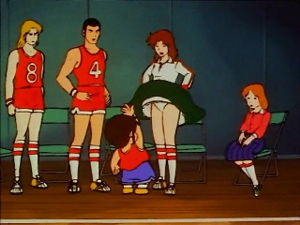
Despite its outdated appearance (even by the standards of the 90s) and a plot that seemed to be concocted by a group of adolescent scriptwriters with complexes, "Gigi la Trottola" quickly won the hearts of Polish viewers. Perhaps because the alternative was reruns of Koziołek Matołek (not that we would diminish the value of this classic and educational cartoon) for the sixth time in a row. The series, a mix of sports struggles and school life, provided young viewers with a daily dose of absurd humor.
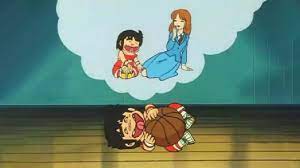
Despite the passage of time, "Gigi la Trottola" remains in the memory of many Poles as one of those strange but charming anime from childhood. It became a gateway to the world of anime for many young viewers, who after passing through it went on to discover Dragon Ball or Ghost in the Shell, humming while on the way:
"Tutte le ragazze sognano di te
Dicono che tu sei grande, Re, Campione
Gridano già Hip Hip Hurrà
Per GIGI la TROTTOLA"
"Strong Japanese Women"
see book by the author
of the page
未開 ソビエライ
An enthusiast of Asian culture with a deep appreciation for the diverse philosophies of the world. By education, a psychologist and philologist specializing in Korean studies. At heart, a programmer (primarily for Android) and a passionate technology enthusiast, as well as a practitioner of Zen and mono no aware. In moments of tranquility, adheres to a disciplined lifestyle, firmly believing that perseverance, continuous personal growth, and dedication to one's passions are the wisest paths in life. Author of the book "Strong Women of Japan" (>>see more)
Personal motto:
"The most powerful force in the universe is compound interest." - Albert Einstein (probably)
Mike Soray
(aka Michał Sobieraj)
未開 ソビエライ
An enthusiast of Asian culture with a deep appreciation for the diverse philosophies of the world. By education, a psychologist and philologist specializing in Korean studies. At heart, a programmer (primarily for Android) and a passionate technology enthusiast, as well as a practitioner of Zen and mono no aware. In moments of tranquility, adheres to a disciplined lifestyle, firmly believing that perseverance, continuous personal growth, and dedication to one's passions are the wisest paths in life. Author of the book "Strong Women of Japan" (>>see more)
Personal motto:
"The most powerful force in the universe is compound interest." - Albert Einstein (probably)
Mike Soray
(aka Michał Sobieraj)
Write us...
Ciechanów, Polska
dr.imyon@gmail.com
___________________
inari.smart
Would you like to share your thoughts or feedback about our website or app? Leave us a message, and we’ll get back to you quickly. We value your perspective!
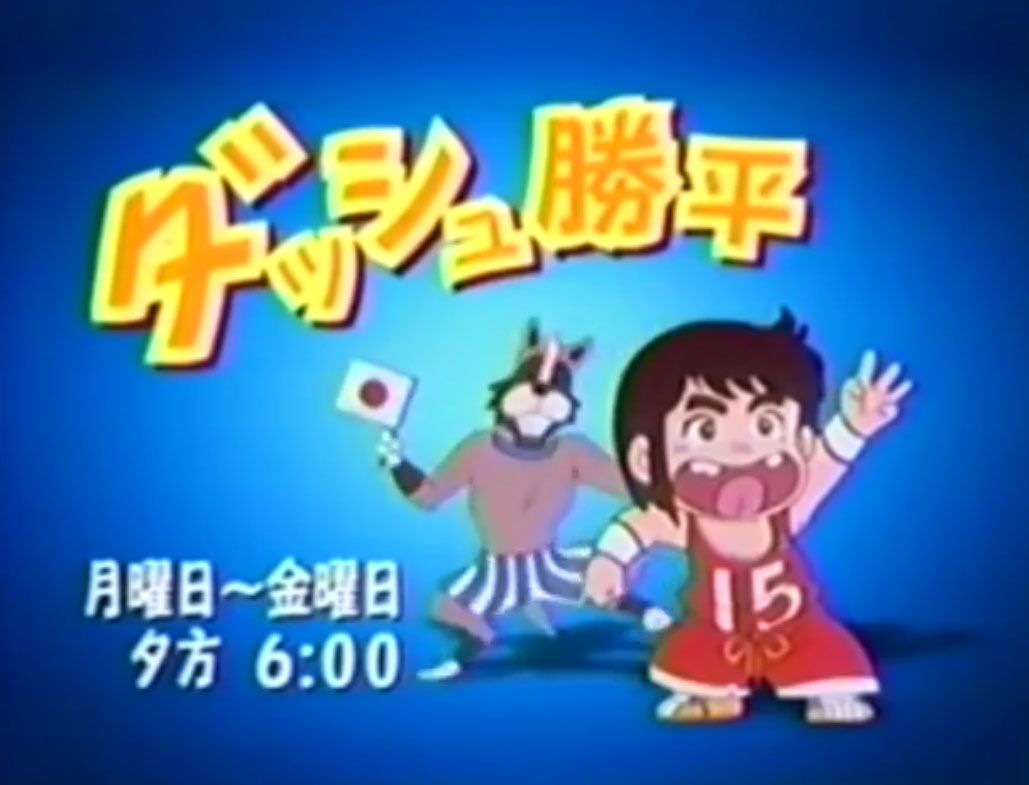 Dash Kappei, the Old Faithful Gigi
Dash Kappei, the Old Faithful Gigi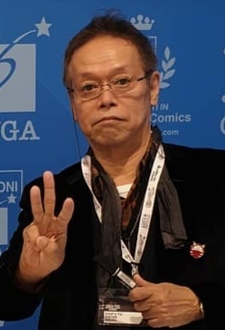 The Idea of Noboru Rokuda
The Idea of Noboru Rokuda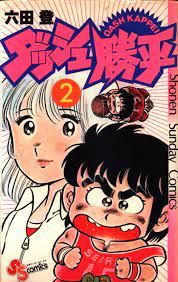 Adapting the Manga into Anime
Adapting the Manga into Anime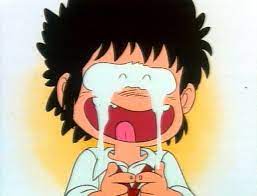 Kappei: A Blend of Agility and Humor
Kappei: A Blend of Agility and Humor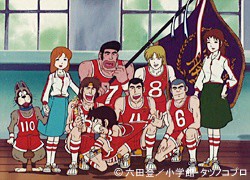 Other Characters: A Colorful Team
Other Characters: A Colorful Team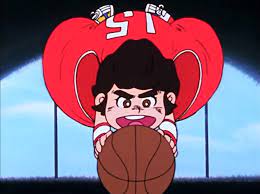 Absurdity in Sports Plots
Absurdity in Sports Plots Romantic Threads and Their Comical Aspects
Romantic Threads and Their Comical Aspects Kappei's Rivals: Competition on and off the Field
Kappei's Rivals: Competition on and off the Field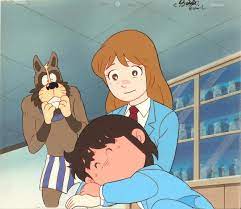 Akane or Anna: Sense, Beauty, Object of Sighs
Akane or Anna: Sense, Beauty, Object of Sighs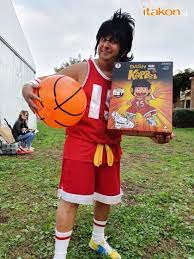 Reception in Japan and Around the World
Reception in Japan and Around the World
